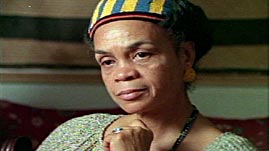Sonia Sanchez is considered one of the most important figures in African American literature. She was born Wilsonia Driver in 1934 in Birmingham, Alabama. Her mother died when Sanchez was a year old. She went to live with her paternal grandmother for a time, who taught her to read at age 4. Her beloved "Mama" died when Sanchez was 6, leaving the child to drift from one relative to the next. By age 6 1/2, Sanchez was writing poetry. She recalls that it was her writing that kept her going during those tumultuous years.
In 1943, at the age of 9, Sanchez and her older sister moved with their father to the Harlem district of New York City. After graduating from high school, Sanchez earned a bachelor of arts degree in political science from Hunter College in 1955, then went on to do postgraduate work at New York University. It was during this time that Sanchez became active in the Civil Rights movement. As African American activists made clear, racial discrimination was not limited to the South. In the early 1960s, Sanchez joined the New York City chapter of the Congress of Racial Equality (CORE). New York CORE, among other things, protested racial discrimination in the North. As a member of CORE, she heard Martin Luther King, Jr. give his famous "I Have a Dream" speech in Washington D.C. and later returned to New York to be "involved in that dream . . . [and] do some real work in this country." This work included protesting the "subtle segregation that existed in New York City."
While in CORE, Sanchez also had the opportunity to hear civil rights leader Malcolm X speak. A spokesperson for the Nation of Islam, a Black Muslim group, Malcolm X's militant ideas and fiery language had a profound effect on Sanchez. She recalled that Malcolm X was not afraid to say what African Americans had been thinking. He put their anger and frustration into words. "He said it out loud," Sanchez remembers, not just "behind close doors. He took on America for us."
Influenced by the ideas, language, and passion of Malcolm X, Sanchez's first two books of poetry,
Home Coming (1969) and
We a BaddDDD People (1970), reflect her embrace of black heritage. Considered combative, and sometimes written in dialect, her poems addressed racism, reproved abuse, and challenged sexism.
Sonia Sanchez was a central figure of the Black Arts Movement of the 1970s, a community of black activists who employed their creative skills to produce plays, poetry, music, and art that expressed the pride and anger of the era. A member of the Nation of Islam from 1971 to 1976, Sanchez became disillusioned with the organization, in particular over their attitudes toward women. Still, she recalled, "There was a very real atmosphere of strength in the Nation."
After three decades in Harlem, Sanchez moved to Philadelphia in 1976. She spent the next 20 years teaching at Temple University, where she was chairperson of the English Department. Over the course of her distinguished career, she has written dozens of books of poetry, as well as seven plays, three children's books, and numerous essays. She has lectured at more than 500 universities, and has been a strong advocate of the creation of African American Studies programs at colleges and universities.

 Loading Standards
Loading Standards